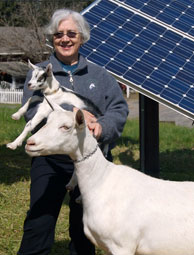John Ivanko and Lisa Kivirist
Hobby Farms Contributors
Wednesday, April 18, 2012

Courtesy Redwood Hill Farm and Creamery
Jennifer Bice lives out Earth Day every day at her farm, dairy and business in California.
For Jennifer Bice, owner of Redwood Hill Farm and Creamery, in Sebastopol, Calif., pursuing the right livelihood has always been about following your passions and caring for the land and the animals that roam on it. And for Jennifer, Earth Day (quickly approaching on April 22) is every day, when taking time to care for the environment, animals and employees is more important than reeling in profits for her business.
“My parents, Kenneth and Cynthia Bice, moved us from Southern California to Sebastopol with the idea of living a more rural lifestyle of raising animals, having a vegetable garden and orchard,” says Jennifer, whose parents started Redwood Hill Farm in 1968 and turned it into a grade-A goat dairy business.
“This was the 1960s and the ‘back to the land’ movement was underway,” she says. “They got some of everything, and the goats quickly became the favorite of us kids since they are more like dogs in their personality and were much more interactive. My brothers, sisters and I (all 10 of us) joined 4-H, and with each of us having our own goats as a project, it added up to a herd quickly.”
As Hobby Farms readers know, the “back to the land” movement is experiencing a similar resurgence today. It even inspired our book, Rural Renaissance, as we recognized a hunger of knowledge among some people who wanted to regain greater self-reliance, derive a livelihood off the land and reconnect with nature. How the current movement differs a bit from earlier movements, however, is that people are making the conscious decision not disappear into the woods. Rather they want to contribute more to society, restore the land, eat healthier and power their farms and businesses with solar energy, not fossil fuels.
In 1978, Jennifer took over the business, and once again, Redwood Hill Farm is taking part in the “back to the land” movement. Situated on 20 acres, the farm is powered by 580 kW photovoltaic system, completed in 2010, which supplies 100-percent of the energy for the farm’s operations. Care for the animals and the pasture has always been paramount for Redwood Hill Farm. Jennifer and her employees care for more than 300 goats, and when their goats retire, they’re allowed to live out their natural life on pasture.
“Our goat dairy was the first to be Certified Humane in the United States,” Jennifer says. The Humane Farm Animal Care’s {cms_selflink page=’home’ text=’Certified Humane Raised and Handled’} label is considered the gold standard for third-party certification for the humane treatment of animals. “We do not believe in factory farming and industrial large-scale production of food.”
To Read the Entire Article, Please Click the Link Below:
www.hobbyfarms.com

Hobbyfarms.com
Posted: April 18, 2012 by Certified Humane
John Ivanko and Lisa Kivirist
Hobby Farms Contributors
Wednesday, April 18, 2012
Courtesy Redwood Hill Farm and Creamery
Jennifer Bice lives out Earth Day every day at her farm, dairy and business in California.
For Jennifer Bice, owner of Redwood Hill Farm and Creamery, in Sebastopol, Calif., pursuing the right livelihood has always been about following your passions and caring for the land and the animals that roam on it. And for Jennifer, Earth Day (quickly approaching on April 22) is every day, when taking time to care for the environment, animals and employees is more important than reeling in profits for her business.
“My parents, Kenneth and Cynthia Bice, moved us from Southern California to Sebastopol with the idea of living a more rural lifestyle of raising animals, having a vegetable garden and orchard,” says Jennifer, whose parents started Redwood Hill Farm in 1968 and turned it into a grade-A goat dairy business.
“This was the 1960s and the ‘back to the land’ movement was underway,” she says. “They got some of everything, and the goats quickly became the favorite of us kids since they are more like dogs in their personality and were much more interactive. My brothers, sisters and I (all 10 of us) joined 4-H, and with each of us having our own goats as a project, it added up to a herd quickly.”
As Hobby Farms readers know, the “back to the land” movement is experiencing a similar resurgence today. It even inspired our book, Rural Renaissance, as we recognized a hunger of knowledge among some people who wanted to regain greater self-reliance, derive a livelihood off the land and reconnect with nature. How the current movement differs a bit from earlier movements, however, is that people are making the conscious decision not disappear into the woods. Rather they want to contribute more to society, restore the land, eat healthier and power their farms and businesses with solar energy, not fossil fuels.
In 1978, Jennifer took over the business, and once again, Redwood Hill Farm is taking part in the “back to the land” movement. Situated on 20 acres, the farm is powered by 580 kW photovoltaic system, completed in 2010, which supplies 100-percent of the energy for the farm’s operations. Care for the animals and the pasture has always been paramount for Redwood Hill Farm. Jennifer and her employees care for more than 300 goats, and when their goats retire, they’re allowed to live out their natural life on pasture.
“Our goat dairy was the first to be Certified Humane in the United States,” Jennifer says. The Humane Farm Animal Care’s {cms_selflink page=’home’ text=’Certified Humane Raised and Handled’} label is considered the gold standard for third-party certification for the humane treatment of animals. “We do not believe in factory farming and industrial large-scale production of food.”
To Read the Entire Article, Please Click the Link Below:
www.hobbyfarms.com
Category: news